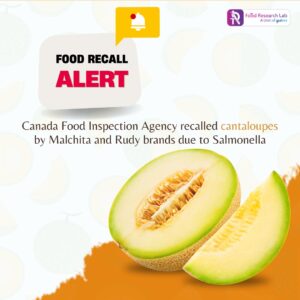
06
Jan
Subject:
Cantaloupes recalled due to Salmonella in Canada
Products Recalled:
Cantaloupes by Malichita and Rudy brands recalled due to contamination by Salmonella.
Problem:
- On November 17th, 2023, Cantaloupes by Malichita and Rudy brands were recalled since they were contaminated with Salmonella.
- Six people have died in a Salmonella outbreak and 153 cases have been confirmed.
- The problem was identified during an investigation by Canadian Food Inspection Agency (CFIA), leading to a product recall. According to the agency, 44% of those who were ill were 65 and older, while 35% were children aged five and under (Figure 1).
- Consumers and distributors and instructed not to consume, distribute, sell, or serve the product [1].
Scientific Evidence:
- Salmonella is one of the most common foodborne pathogens that causes illness although food contaminated with it may not look or smell spoiled.
- Although animals are the common reservoirs for Salmonella, plants can also harbour the microorganism.
- Short-term symptoms in healthy adults include fever, headache, vomiting, nausea, abdominal cramps, and diarrhea. Severe arthritis is one of the long-term complications. Salmonella may cause severe, sometimes infection in pregnant women, children, the elderly and those with weakened immune systems [2].
Product Image:

What Regulations Clarify?
- Warm water and brush should be used to clean the melons that could be contaminated by soil, water, animals, and improperly composted manure.
- Likewise, warm water and soap should be used to thoroughly wash all utensils, countertops, and cutting boards before and after handling melons.
- Whole/uncut melons can be refrigerated for up to 15 days, depending on the ripeness, variety, and growing conditions.
- Cut melons should be refrigerated immediately and stored in the refrigerator for up to four days. Any cut melons that have been left at room temperature for more than two hours should be discarded.
- Before cutting the melon, thoroughly wash and scrub the entire melon with warm water using a clean produce brush. Bacteria from the outer rind can transfer to the inner flesh of the melon if you cut into it before washing.
- There is no need to use anything other than water when washing melons. Washing melons gently under fresh, cool running water is as effective as using produce cleansers.
- Throw away melons that are bruised or rotten [3].





